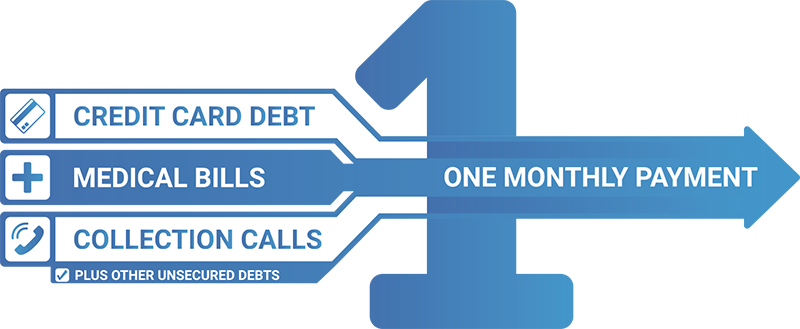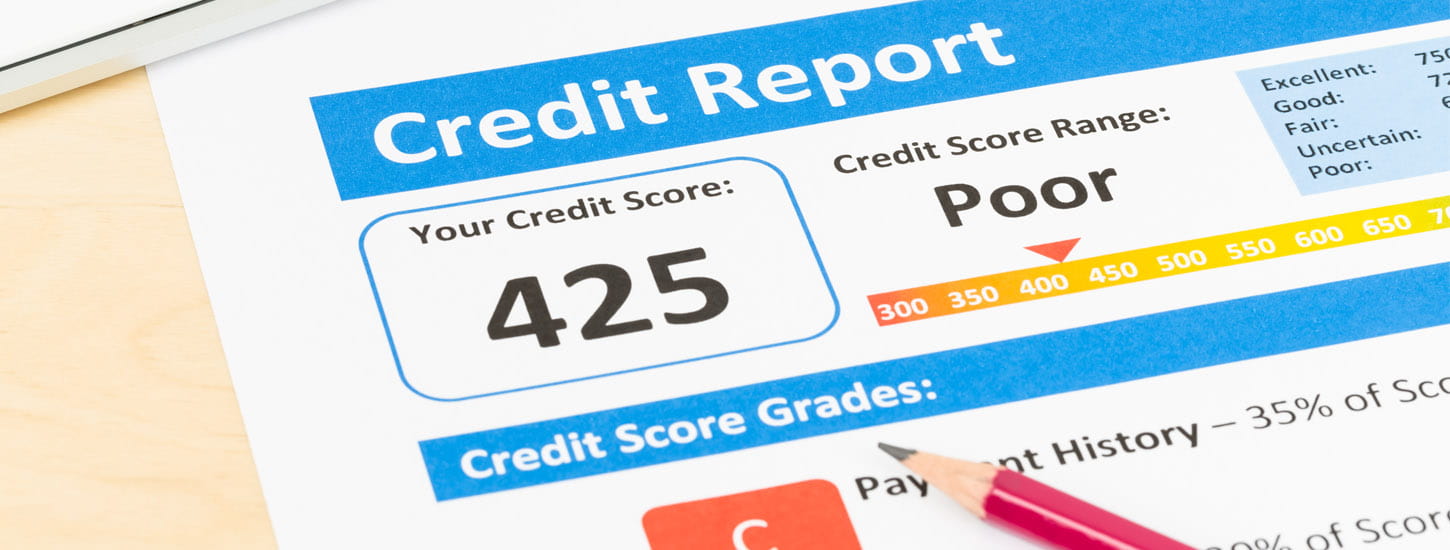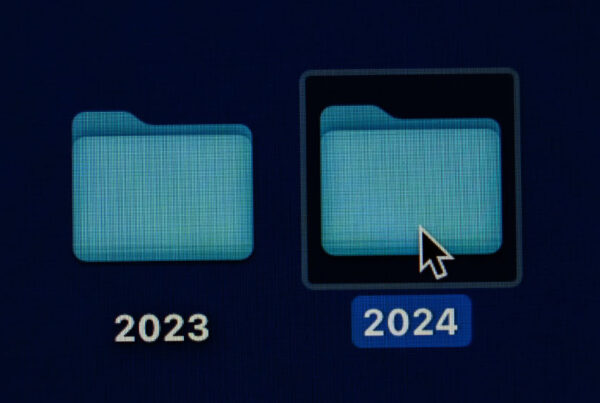If you have thought about consolidating your debts but heard how difficult it can be to qualify for a debt consolidation loan or even a credit card balance transfer if you have less-than-great credit, you may be discouraged wondering what someone with bad credit can do to consolidate their debts.
How do you consolidate your debts if you have bad credit?
Individuals and couples who have a poor credit rating may struggle to qualify for a debt consolidation loan or a credit card balance transfer offer. However, they can still take advantage of a debt consolidation program through a nonprofit credit counseling agency to consolidate all their debt payments into one monthly payment.
There are five debt consolidation options to consider. Two of them take into account your credit rating above all other qualifying factors. Two others include your credit rating as an important qualifying factor. Only one debt consolidation option does not consider your credit score as a factor in its qualifications.
Debt Consolidation Options that Rely Heavily upon Your Credit Rating
1. Debt Consolidation Loan
2. Credit Card Balance Transfer
Because these are new loans, and neither have any collateral involved to defray the risk taken on by the new lender, it is understandable that credit ratings play such an important role in your account qualification. If you are unable to make your new account payment on time or as agreed, the lender has nothing to fall back on other than to report your payment activity to the consumer reporting agencies (aka credit bureaus), take a loss by selling your account to a collection agency, or to face the expensive option of taking you to court and hoping to garnish your wages.
Consequently, if you have poor credit, you may be unable to qualify for a debt consolidation loan from a traditional lender (bank or credit union). In such cases, some potential borrowers will turn to an online peer-to-peer lending site like Prosper.com or LendingClub.com. Besides looking over your credit rating, individuals who have money to offer as potential lenders may also consider your story. Their lending policies are less standardized, making it possible to borrow with a much lower credit rating. However, be aware that loans through these and other peer-to-peer sites typically come with higher interest rates (in the low double-digit range), making it more expensive to repay your consolidated debts.
Can You Get a Debt Consolidation Loan with a Low Credit Score?
 Credit scores currently serve as the best predictors of the future likelihood that a borrower will miss a payment. Because the best predictor of future behavior is recent past behavior, your credit score depends greatly upon your payment and debt-related activities over the past 6 to 24 months (although activity from as long ago as 10 years can be a factor).
Credit scores currently serve as the best predictors of the future likelihood that a borrower will miss a payment. Because the best predictor of future behavior is recent past behavior, your credit score depends greatly upon your payment and debt-related activities over the past 6 to 24 months (although activity from as long ago as 10 years can be a factor).
The higher your credit score, the more you have recently paid your debts as agreed. The lower your score, the more likely you are to have missed debt payments recently or had debts go to collections.
FICO scores in the mid-700 range will typically qualify any borrower for the best repayment terms a lender offers. Borrowers with a score of 690 can still qualify for the best home mortgage interest rates offered by lenders working with the Federal Housing Administration. Scores below 600, and certainly those in the mid-500s, are considered sub-prime because they indicate the borrower is highly likely to miss future payments on current or future debts.
Consequently, a credit score of 550 or lower means that you will have a difficult time qualifying for any kind of loan, but particularly a debt consolidation loan (DCL). DCLs are, by their very nature, riskier to the lender because the borrower is indicating by his or her application that he or she is struggling to pay their current debts on time and as agreed.
Individuals and couples with poor credit scores should consider the debt consolidation option listed below that does not take credit ratings into account.
Debt Consolidation Options that Include Your Credit Rating and Other Factors
The two debt consolidation options that include your credit rating as a qualifying factor but not as the sole factor both require you to be a homeowner. These are a home equity loan (HEL) and a home equity line of credit (HELOC). If your home is worth at least 20% more than what you owe on it, you can often qualify for an HEL or a HELOC.
Lenders consider both the amount of equity in your home as well as your credit rating. Having sufficient home equity is a requirement, but so is a decent credit score. If your credit is poor, you may either be denied an HEL or a HELOC or the terms may include an onerous (burdensome) interest rate.

Debt Consolidation Option for Any Credit Rating
Only a debt management plan through a nonprofit credit counseling agency offers payment consolidation of your debts without regard to your credit rating. Whether your score is high or low (or somewhere in between), it is not a factor in qualifying for a debt consolidation program.
 DMP participation depends upon the individual’s or couple’s choice to enroll. Since lenders offer account concessions to the borrower (lower APRs, waived late fees, etc.), they may choose whether to approve those concessions and how deeply to cut their interest rates, but that does not preclude the borrower from participating in the DMP monthly payment consolidation service.
DMP participation depends upon the individual’s or couple’s choice to enroll. Since lenders offer account concessions to the borrower (lower APRs, waived late fees, etc.), they may choose whether to approve those concessions and how deeply to cut their interest rates, but that does not preclude the borrower from participating in the DMP monthly payment consolidation service.
Lenders offering concessions through a DMP typically consider the borrower’s history of payments, the presence of steady income for the borrower, and the borrower’s other household expenses.
Steps to Consolidate Your Debt when You Have Bad Credit
Before you start applying for debt consolidation products such as credit card balance transfers, debt consolidation loans, home equity loans or home equity lines of credit, you should first check your own credit report and even a credit score. Since 2004, you have had the right to pull your free credit report (no credit card needed) from AnnualCreditReport.com. There is no fee, and doing so will have no effect at all on your credit rating. You can pull one, two or all three reports from the largest consumer reporting agencies (Equifax, Experian and TransUnion).
Your credit reports will list all credit accounts you have opened, used or closed in the past seven to ten years or so. Accounts can include credit cards, retail store cards, collection accounts, car loans, home loans, student loans in repayment, co-signed loans, your authorized user accounts, and any other debt you have acquired. Your reports will also include detailed information on when the accounts were opened, their current status (paid, closed, open, transferred, in collections, etc.), the current balance, the highest balance, the original balance, and more.
Go through this information looking for errors. Three in four credit reports have some sort of error on it, even if just a mistakenly transcribed telephone number. However, if you notice a problem, use the error dispute link on the home pages of Equifax.com, Experian.com and TransUnion.com to initiate an investigation. Doing so takes just a few minutes once you sign up for a free account, and the investigation takes just thirty days or less.
You will not receive a credit score with these free credit reports. The federal law that mandated the free reports did not mandate a free credit score. If you want a FICO score like the score potential lenders will use, you will have to pay for it at myFICO.com. However, most consumers will be fine using instead a free credit score service such as CreditKarma.com, Mint.com, CreditSesame.com, and Credit.com, to name just a few.
If your report and score portray you as a high credit risk (low score, high balances, late payments, collection accounts, etc.), you may struggle to qualify for any debt consolidation loan. If such is the case, you should consider the payment consolidation option through a nonprofit credit counseling agency. This consolidation does not involve your credit rating as a qualification factor.
Talk to a certified credit counselor if you need help
One of the harsh realities of debt is there is no pleasant way to get out of it without making payments. Even bankruptcy courts and bankruptcy attorneys require fees that are beyond the ability of many households to pay, especially if those households are dealing with unemployment or on a minimal fixed income. Many consumers feel they don’t even have enough money to file for bankruptcy.
If you struggle to pay your bills and worry about failing in your future financial obligations, your next stop should be a nonprofit credit counseling agency approved by the US Department of Justice Executive Office of the US Trustee to provide credit counseling services for individuals considering bankruptcy. Although approval does not mean the DoJ endorses or assures the quality of an agency’s services, it does mean that these credit counseling agencies should help consumers put together a workable budget, consider debt repayment and consolidation options, and, if necessary, issue the certificate of counseling required by bankruptcy courts to accompany all personal bankruptcy petitions.
About the Author
Author and Accredited Financial Counselor®, Todd R. Christensen, MIM, MA, is the Education Manager for Debt Reduction Services, a nationwide nonprofit financial wellness and credit counseling agency. Todd develops educational programs and produces materials that teach personal financial skills and responsibilities to all ages. He’s also the author of the book Everyday Money for Everyday People.










